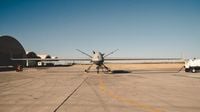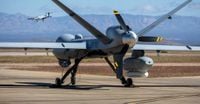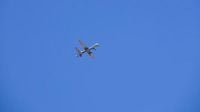WASHINGTON — In a significant move that underscores the evolving dynamics of military partnerships in the Middle East, the U.S. government has approved a potential sale of eight MQ-9B unmanned aerial vehicles (UAVs) to Qatar, valued at approximately $1.96 billion. This deal, announced on March 26, 2025, marks the first sale of these advanced drones to a Middle Eastern nation, highlighting Qatar's growing military capabilities and the U.S.'s commitment to supporting its allies in the region.
The proposed sale includes not just the drones but also a comprehensive package of military equipment. This encompasses hundreds of bombs, numerous missiles, several radars, radios, satellite communication ground systems, and related technical support from the U.S. government. The State Department emphasized that this sale aligns with U.S. foreign policy and national security objectives, aimed at bolstering the security of a friendly nation that plays a crucial role in maintaining political stability and economic progress in the Middle East.
According to the State Department's public notification, "This proposed sale will improve Qatar’s capability to meet current and future threats by providing timely intelligence, surveillance, and reconnaissance, target acquisition, counter-land, and counter-surface sea capabilities for its security and defense." This move is seen as a step towards enhancing Qatar's defense infrastructure as it faces various regional challenges.
Qatar's interest in acquiring armed drones dates back to 2020 when officials initially requested these advanced systems. However, they experienced frustration with the previous Biden administration, which was perceived as slow in processing the request. This recent approval comes shortly after General Atomics Aeronautical Systems, Inc. (GA-ASI) President David Alexander expressed optimism about the future of arms sales to Qatar, particularly under a potentially renewed Trump administration, during a defense conference in the United Arab Emirates on February 19, 2025. Alexander noted, "They mean business now, and they want to see the business deals happen... I predict a lot of action in this area, and a lot of business growth for General Atomics."
The MQ-9B, which can operate in two variants—the SkyGuardian and the maritime-equipped SeaGuardian—is designed for endurance and high-altitude missions, capable of flying for more than 30 hours and reaching altitudes above 40,000 feet. While the announcement did not specify which variant Qatar might acquire, the capabilities of the MQ-9B are expected to significantly enhance its military operations.
As with any Foreign Military Sale (FMS), the specifics of the deal, including the dollar amount and unit count, may change as negotiations unfold. Additionally, there remains the possibility that members of Congress could intervene and place a hold on the sale. J.R. McDonald, vice president of business development for the F-35 program at Lockheed Martin, commented, "Conceivably, based on where we are buying long-lead parts for Lot 21, we could make that happen," indicating the complexities involved in such military transactions.
This deal not only signifies a strengthening of military ties between the U.S. and Qatar but also reflects broader trends in defense procurement in the region. As nations like Qatar seek to modernize their armed forces, the U.S. remains a key supplier of advanced military technology. The approval of this sale is likely to have implications for regional security dynamics, particularly as Qatar enhances its capabilities to address various threats.
Moreover, the potential sale to Qatar comes at a time when the geopolitical landscape in the Middle East is shifting. Countries are increasingly looking to bolster their defense capabilities amidst rising tensions and conflicts in the region. The U.S. has historically played a pivotal role in arms sales to its allies, and this latest approval reinforces its commitment to maintaining strategic partnerships.
In conclusion, the approval of the MQ-9B drone sale to Qatar represents a significant development in U.S. foreign military sales, reflecting both the evolving security landscape in the Middle East and the ongoing commitment of the U.S. to support its allies. As negotiations progress, the outcome of this deal will be closely watched, not only for its immediate implications but also for the broader impact it may have on regional stability and defense collaboration.






